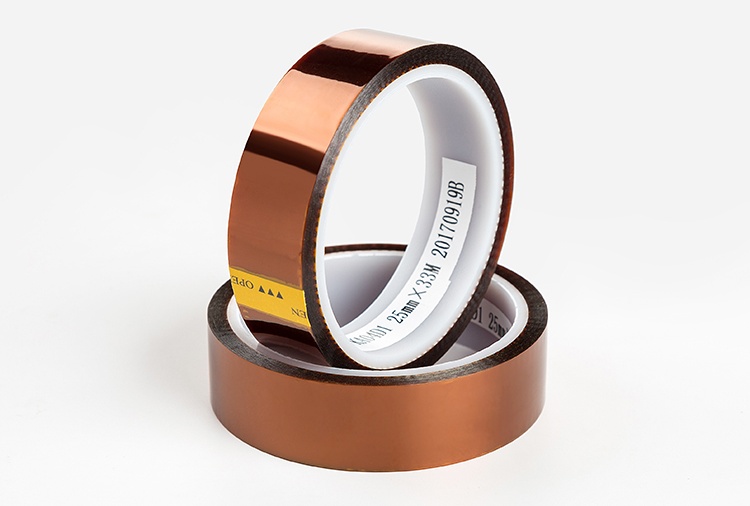
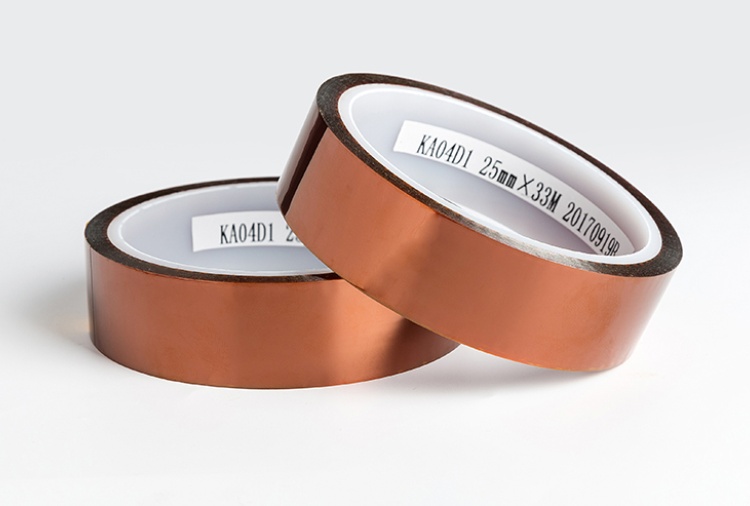
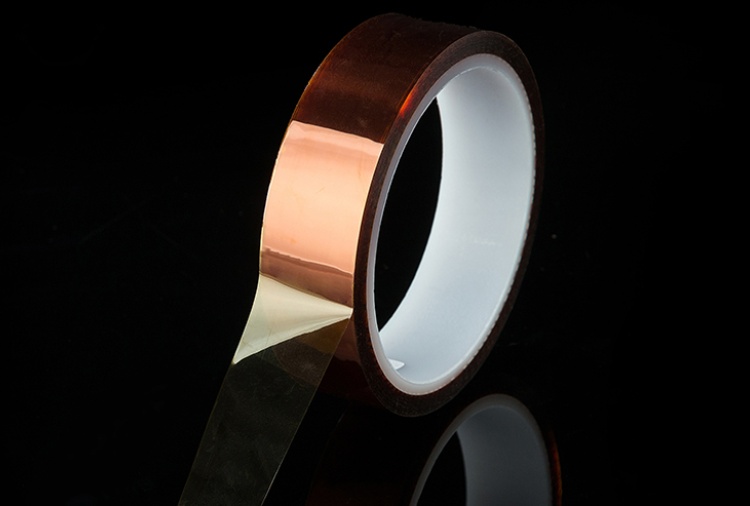
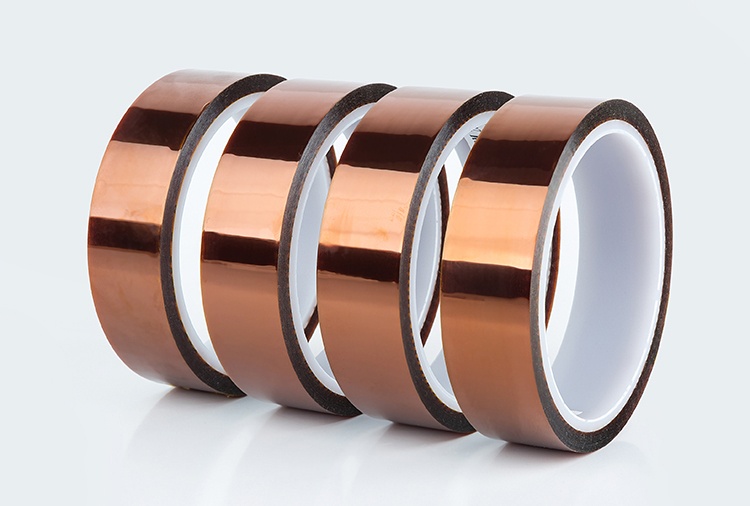
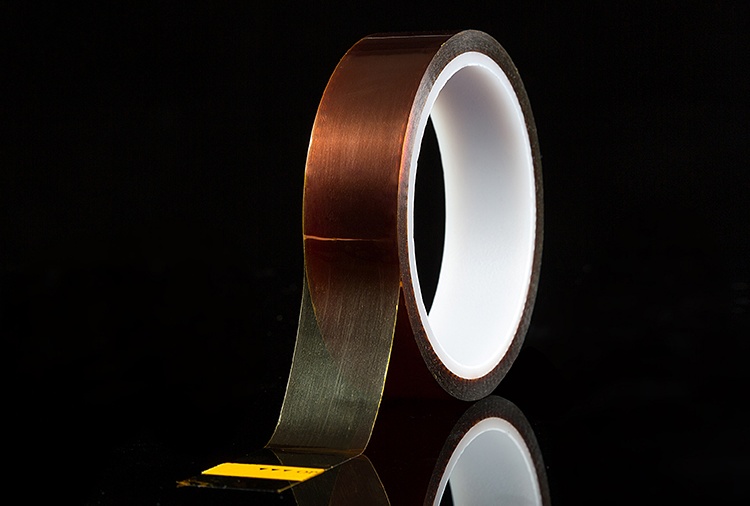

Lithium battery tab tape
High-temperature tape for lithium batteries is made of insulating materials (PP, PET, PI films) as the base material, with a special acrylic adhesive resistant to lithium battery electrolytes coated on it. Its thicknesses are 0.016mm, 0.020mm, 0.03mm, 0.035mm, 0.04mm, and 0.05mm.
Features: High temperature resistance, electrolyte resistance, no warping, no discoloration, and good conformability.
Applications: Insulation and fixation of internal tabs and external circuits of lithium batteries.
Detailed description
Lithium battery tab tape uses polyimide film as the base material, coated with electrolyte-resistant pressure-sensitive adhesive, and is used for the insulation and fixation of internal tabs and external circuits in lithium batteries.
Related Specifications
| Name | ltem No.Model | Material | Colour | Adhesive | standard size | Tack | Adhesion Strength | Tensile Resistance | Exten- sibility | Voltagewithstand | Temperature tolerance | ||
| thick/mm | wide/mm | long/m | N | N/25mm | N/25mm | % | ℃ | ||||||
| Lithium battery tab tape | KA03D | PI | golden yellow | rubber | 0.035 | 500 | 100/400 | 3↑ | 2↑ | 90↑ | 50 | 3kv | 130 |
| Lithium battery tab tape | KA04D | PI | golden yellow | rubber | 0.045 | 500 | 100/200 | 1↑ | 2↑ | 110↑ | 30 | 3kv | 130 |
| Lithium battery tab tape | KA06D | PI | golden yellow | rubber | 0.055 | 500 | 100/400 | 3↑ | 7↑ | 130↑ | 50 | 5kv | 130 |
FAQ
Lens Protection Tape Series
Specialized for encapsulating resin eyeglass lenses during high-temperature curing processes. Key features include high transparency, residue-free removal, and heat resistance up to 130°C (e.g., JT8860 for blue-light-blocking lenses)
Lithium Battery Tape Series
Includes termination tapes (for electrode insulation), PACK tapes (bundle fixation), and tab lead tapes (welding point protection). Made from PI/PET films with electrolytic corrosion resistance, critical for cylindrical/pouch cell safety
LED Encapsulation High-Temperature Tape Series
Designed for LED epoxy resin filling and curing (e.g., MY68C transparent tape for digital tubes). Withstands 150–180°C, prevents overflow, and leaves no residue after peeling
Connector Tapes Series
Insulating tapes for electronic connectors and terminals, ensuring stability in soldering (reflow peak: 260–300°C). Commonly uses PI films for dielectric strength
Insulation & Fixation Tapes Series
Glass fiber-reinforced tapes for coil binding in motors/transformers, offering mechanical strength and flame retardancy (180–220°C continuous use)
High-Temperature Double-Sided Tape Series
Features acrylic/silicone adhesives on PI/PET bases. Used for bonding heat sinks, battery modules, and composite materials, withstanding 120–180°C long-term
Masking Tapes Series
Includes high-temp masking paper and PET green tapes for spray painting, powder coating, and PCB gold finger protection. Resists solvents, leaves sharp edges, and operates at 150–230°C
Teflon Tape Series
PTFE-based tapes with ultra-low friction and 260–300°C continuous resistance. Applied in non-stick industrial conveyors, food packaging seals, and chemical equipment lining
Yes, we can develop tailored solutions based on your sketches or ideas to address your business challenges.
The Company serves all customer segments, offering tailored solutions for large enterprises, small businesses, and individual users.
The tabs are the metal conductors that connect the positive and negative electrodes within a lithium battery (the positive electrode is typically aluminum, and the negative electrode is typically copper or nickel-plated copper). During the battery cell assembly process, the tabs need to connect to the external electrodes. However, the tabs themselves are conductive and may have burrs and protrusions on their edges. Direct contact with other battery cell components (such as the separator and casing) can cause short circuits. Furthermore, the tabs are subject to certain mechanical stresses and temperature fluctuations during welding and packaging processes.
1. Excellent Insulation Performance
The tabs are the conductive terminals of the battery (aluminum for the positive electrode, copper/nickel-plated copper for the negative electrode). Tab tape must possess a high insulation resistance (typically ≥10¹³Ω・cm) to effectively block the electrical connection between the tabs and other battery cell components (such as the casing, separator, and adjacent electrode sheets), fundamentally preventing the risk of short circuits. This is its most fundamental function.
2. High Voltage and Electrochemical Corrosion Resistance
The tabs are exposed to the high voltage environment (especially near the positive electrode) and electrolytes (such as carbonates) within the battery for extended periods. Therefore, the tape must withstand electrochemical corrosion without swelling, decomposition, or aging. Furthermore, it must not generate conductive impurities to prevent degradation of insulation performance due to material failure.
3. High-Temperature Resistance and Thermal Stability
During the production process, tabs undergo high-temperature processes such as welding (such as ultrasonic welding and laser welding, where local temperatures can reach 200-300°C) and cell baking (80-150°C). The tape must maintain structural stability at these temperatures, preventing melting, shrinking, or decomposition, and preventing adhesive loss or carbonization, ensuring a secure bond.
For example, PI-based tape can withstand temperatures exceeding 200°C and is suitable for welding high-power cells; PET-based tape is suitable for medium- and low-temperature applications (up to 120°C).
Good Mechanical Strength and Puncture Resistance
Tab edges may have burrs or cuts, or be subjected to mechanical stress during assembly. Therefore, the tape must possess a certain level of tensile strength, tear resistance, and puncture resistance to prevent puncture from tab burrs or damage from external forces, thereby ensuring the integrity of the insulation layer.
4. Suitable Adhesion and Conformability
Adhesion must be “moderate”: it must firmly adhere to the tab metal surface (aluminum, copper, etc.) and the electrode substrate (such as carbon-coated aluminum foil or copper foil) to prevent peeling during processing; at the same time, it must avoid excessive adhesion, which could damage the tab or electrode during peeling.
Conformability: The tape must closely adhere to the curved surface or edge of the tab, preventing bubbles or wrinkles, and ensuring there are no dead corners in the insulation.
5. Dimensional Stability
During temperature fluctuations or long-term use, the tape’s shrinkage must be extremely low (typically ≤1%) to avoid exposing the tab edge due to dimensional changes, which could lead to insulation failure.
In summary, the core properties of lithium battery tab tape revolve around “reliable insulation, temperature and corrosion resistance, mechanical stability, and proper conformability.” These properties directly impact battery safety, consistency, and service life, and are crucial for tab protection.
The material used for tab tape for lithium batteries must meet core requirements such as insulation, heat resistance, electrolyte resistance, and good adhesion. Common base material and adhesive combinations are as follows:
1. Base Material (Main Insulation Layer)
PET (Polyethylene Terephthalate)
Features: High mechanical strength, good insulation, moderate temperature resistance (long-term operating temperature approximately -40°C to 120°C), and low cost.
Application: Suitable for medium- and low-temperature applications (such as conventional battery cell welding and assembly processes). It is currently one of the most commonly used base materials for tab tape, especially in consumer lithium batteries.
PI (Polyimide)
Features: Excellent high-temperature resistance (long-term operating temperature up to 200°C to 260°C), chemical resistance (strong electrolyte resistance), high insulation and mechanical strength, but relatively high cost.
Application: Suitable for high-temperature welding processes (such as laser welding and ultrasonic welding, where local temperatures can reach over 200°C). It is often used in applications requiring high temperature resistance, such as power lithium batteries (such as new energy vehicle batteries). PP (Polypropylene)
Features: Excellent chemical resistance (strong resistance to electrolyte swelling), good flexibility, and low cost, but poor temperature resistance (long-term operating temperature approximately -20°C to 80°C).
Applications: Suitable for applications where temperature resistance is not critical, or as a secondary insulation layer in some low-end battery cells.
Other special substrates
Such as PI/PET composite substrates (combining the heat resistance of PI with the low cost of PET) and fluoroplastics (extremely corrosion-resistant, suitable for use in special electrolyte environments) are used based on customized requirements.
II. Adhesive (Laminating Layer)
The adhesive must match the substrate and meet the requirements for adhesion to the metal tabs (aluminum, copper), electrolyte resistance, and temperature resistance:
Acrylic Adhesive
Features: Moderate adhesion, good temperature resistance (suitable for medium and low temperature applications with PET substrates), stable electrolyte resistance, and low cost, making it the mainstream choice. Silicone
Features: Excellent high-temperature resistance (suitable for high-temperature applications with PI substrates), good flexibility, and strong chemical resistance. However, its adhesion is relatively low and its cost is relatively high. It is often used in high-end applications such as power cells.
Lithium battery tab tape is a functional tape designed for the tabs (the conductive terminals of the positive and negative electrodes). Its core uses revolve around tab protection, insulation, and process adaptation. Specifically, they are as follows:
1. Insulation and short circuit prevention
Tab tape is a metal conductor (mostly aluminum for positive electrodes and copper or nickel-plated copper for negative electrodes). Direct contact with other battery cell components (such as the casing, separator, and adjacent electrode sheets) can cause a short circuit. Tab tape covers the surface or base of the tab, forming an insulating barrier that blocks unintended current conduction and is a key protective measure against internal short circuits in the battery cell.
2. Protecting the tabs from damage to other components
During processing (such as cutting and welding), tab edges can easily develop burrs, protrusions, or sharp cuts. Direct contact with the separator (the core insulating layer of a lithium battery) can pierce the separator, causing a short circuit between the positive and negative electrodes. Tab tape covers these imperfections, providing a “buffered protection” effect, preventing the tab from damaging the separator or other insulating components. 3. Enhance the stability of the tab-to-electrode connection
The tabs are connected to the positive and negative electrode sheets (aluminum foil/copper foil) through welding or riveting. They may be subjected to mechanical stress during cell winding, packaging, or charging and discharging. Tab tape, applied to the tab-to-electrode connection, strengthens the bond, prevents the tabs from falling off, loosening, or deforming, and ensures stable current conduction.
4. Withstands the internal battery environment, ensuring long-term reliability
Tab tape must be exposed to the electrolyte (such as carbonates) and temperature fluctuations (heat generated during charging and discharging) within lithium batteries. Its chemical and temperature resistance prevents swelling, debonding, or aging failure, ensuring continued protection throughout the battery lifecycle.
5. Adapts to production processes, improving processing efficiency
In automated production lines, tab tape must exhibit excellent conformability (no bubbles or wrinkles) and cutting performance, precisely fitting the tab shape. It must withstand the high-temperature environments of high-speed welding processes (such as ultrasonic and laser welding) to prevent tape failure from impacting production continuity.
The company mainly provides the following types of lithium battery tab tapes: KA03D, KA04D, KA06D. The base materials are all polyimide, and the adhesives are all electrolyte-resistant and pressure-sensitive adhesives.
